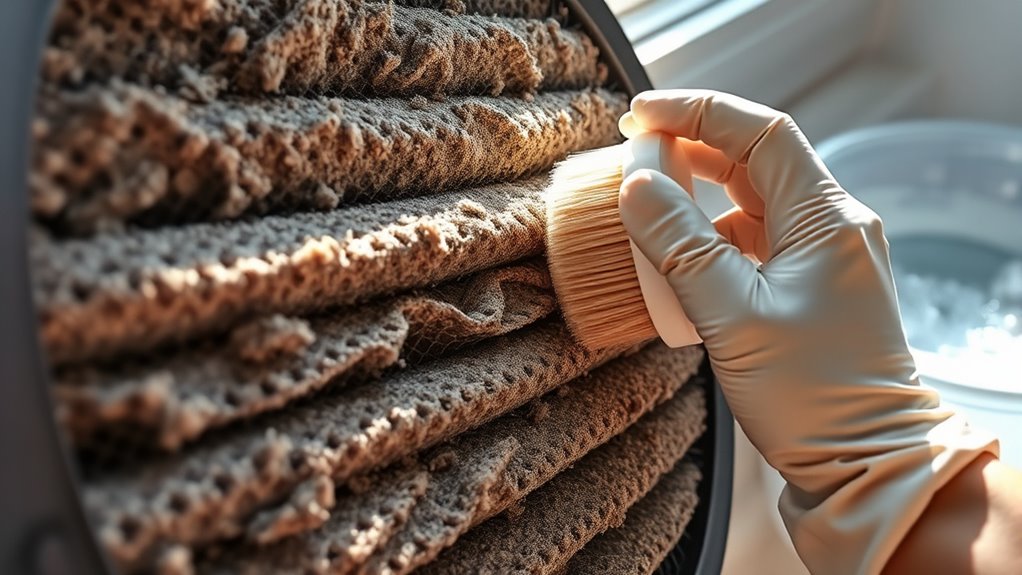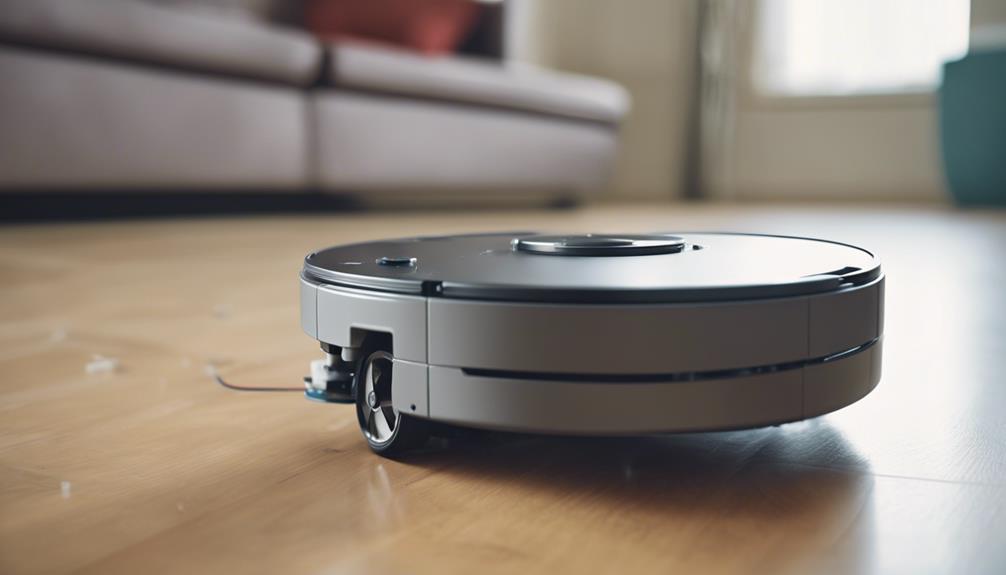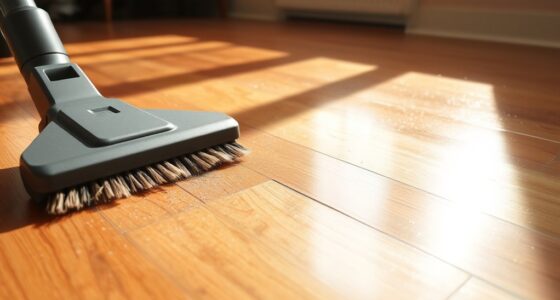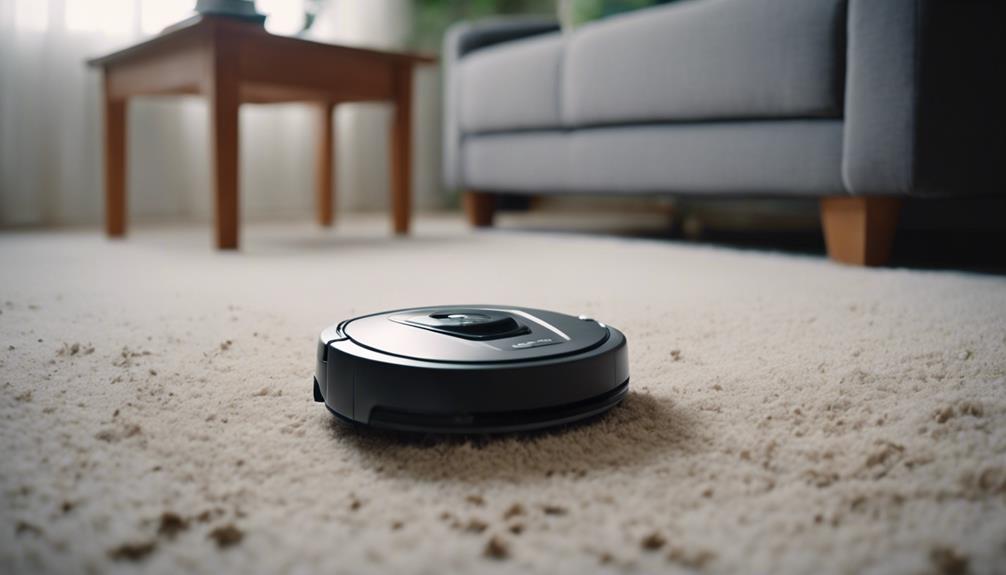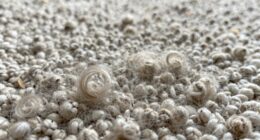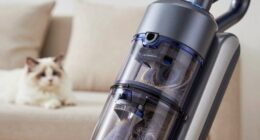Vacuum filters get dirty fast due to high household activity, especially with pets, and frequent outdoor allergens entering your home. Low-quality filters also clog quicker, affecting suction power and airflow. You can clean foam and washable filters by rinsing them, while pleated paper filters should just be tapped clean. It’s crucial to replace HEPA filters every 3 to 6 months. For more insights on maintaining your vacuum’s efficiency, keep exploring the best practices.
Key Takeaways
- High household activity, especially with pets, significantly increases dust and dander, leading to rapid filter clogging.
- Frequent opening of windows and doors introduces outdoor allergens, contributing to faster dirt accumulation in filters.
- Low-quality filters clog more quickly than HEPA filters, necessitating more frequent cleaning or replacement.
- Symptoms of clogged filters include reduced suction power, unpleasant odors, and visible dirt buildup indicating cleaning or replacement is needed.
- Clean foam and washable filters with water, while replacing HEPA filters every 3 to 6 months to maintain vacuum performance.
Understanding the Importance of Vacuum Filters
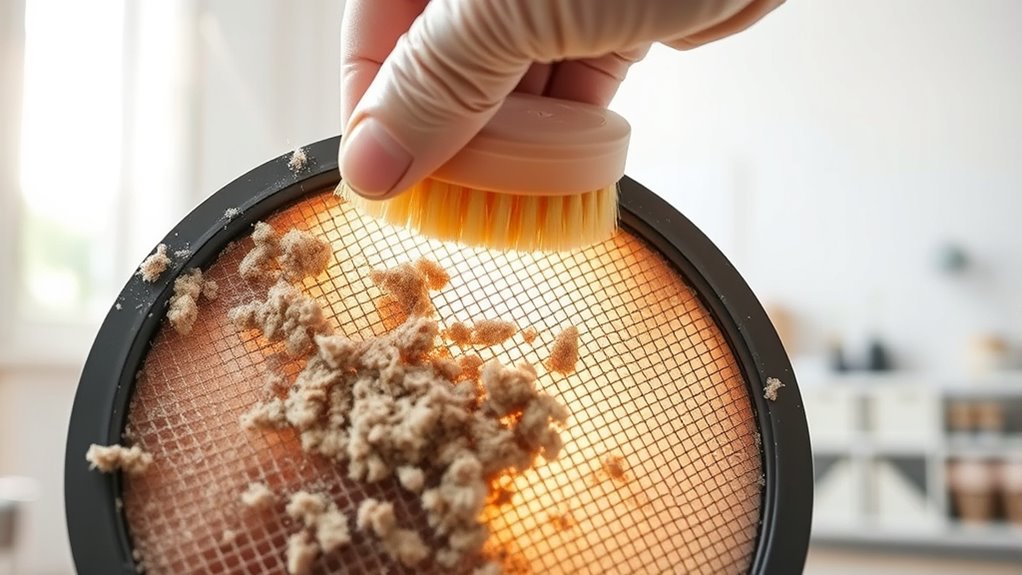
While you may not think about it often, vacuum filters are essential for maintaining a clean and healthy home. A dirty filter can severely reduce suction power, making your vacuum less effective at capturing dirt, debris, and allergens. This directly impacts your indoor air quality, potentially compromising your health. By regularly cleaning your vacuum filter, you can extend its life and boost its performance, ensuring your home stays fresh and allergen-free. Remember, HEPA filters are critical for trapping allergens but shouldn’t be cleaned—replace them instead for ideal air quality. Additionally, proper airflow around the unit can enhance the effectiveness of your vacuum, just as it does for air purifiers. Maintaining clean filters is crucial for respiratory health and overall well-being since it helps reduce exposure to harmful airborne pollutants. Regular maintenance of your vacuum can lead to improved dust removal and a healthier living environment for you and your family. Moreover, the use of high suction power vacuums can significantly aid in capturing more dirt and allergens from your home. Furthermore, investing in a robot vacuum with advanced sensors can help optimize your cleaning process by ensuring thorough coverage of your floors.
Prioritizing vacuum filter maintenance not only enhances your cleaning efficiency but also contributes to a healthier living environment, making it an essential task in your home care routine.
Common Causes of Rapid Dirt Accumulation
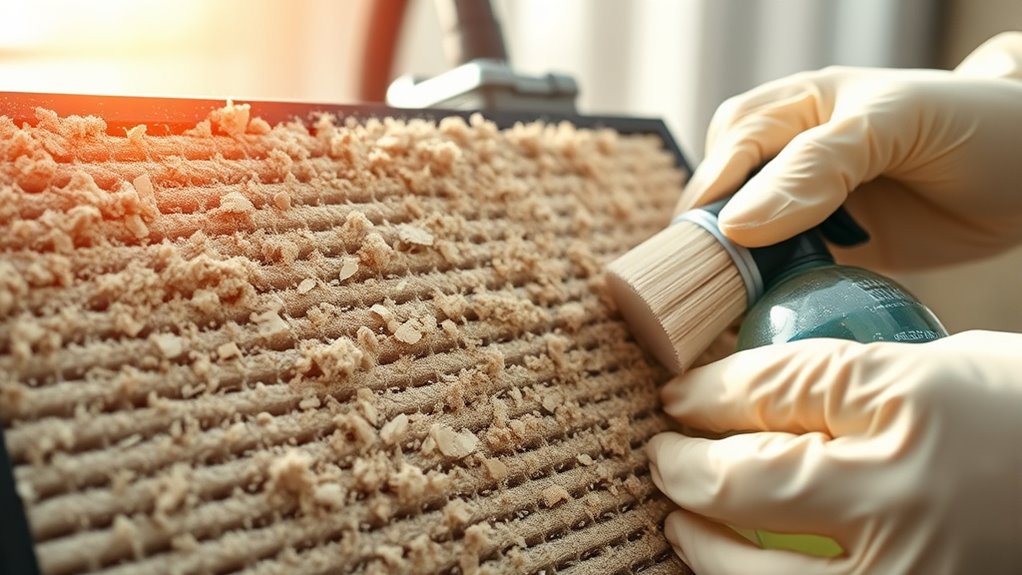
Rapid dirt accumulation in your vacuum filter can catch you off guard, especially when you’re not aware of the factors contributing to it.
High household activity, particularly if you have pets, leads to increased dust and dander, clogging your vacuum filter faster. Frequent opening of windows and doors introduces outdoor allergens, adding to the buildup. Additionally, using a home security system can help monitor your home’s environment, which may reduce dust and allergens. Maintaining a clean home not only minimizes these pollutants but also promotes better indoor air quality. Regular vacuuming can also help prevent excessive buildup in filters by reducing the amount of debris that gets trapped.
If you’re using HVAC systems heavily during extreme weather, that can increase airborne particles too. Low-quality filters, like standard fiberglass, tend to clog quicker than HEPA filters designed for better filtration.
Environmental factors, such as living in dusty areas or dealing with heavy pet shedding, also accelerate the need to replace or clean your vacuum filter more frequently. Additionally, investing in high-quality filters can significantly reduce the frequency of cleaning required and improve overall vacuum efficiency. A vacuum’s filtration system plays a crucial role in how effectively it can manage dirt and allergens.
Symptoms of Clogged Filters
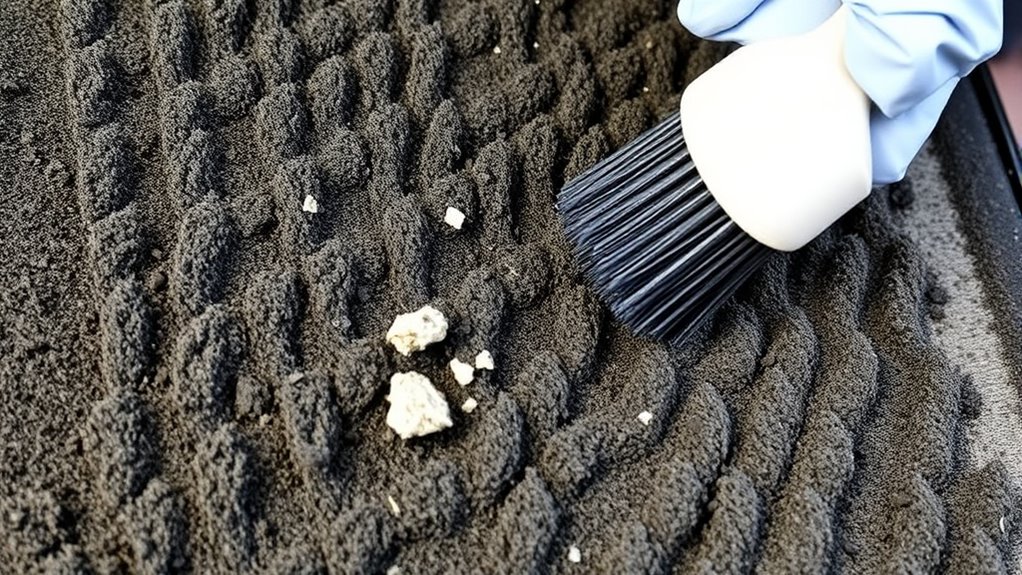
A clogged vacuum filter can considerably hinder your cleaning efforts, making it essential to recognize its symptoms early.
One of the first signs you’ll notice is reduced suction power, which makes it difficult for your vacuum to pick up dirt and debris effectively. You might also detect unpleasant odors emanating from the vacuum, indicating trapped dust and allergens. Regular maintenance is crucial, especially with high-performance models like Dyson V11 that rely heavily on clean filters for optimal efficiency. Filters that are frequently neglected may contribute to necessary cookies that are essential for basic site functionalities. Additionally, the increasing trend towards plant-based spreads may reflect a broader shift in consumer preferences, which can influence the market for household products like vacuums. Regular cleaning can help prevent issues similar to those caused by clogged mechanisms in toilets, ensuring your vacuum remains efficient.
If you see visible dirt buildup on filters, it’s time for cleaning or replacement to maintain peak performance. Additionally, frequent overheating during operation suggests that clogged filters are restricting airflow, stressing the motor.
Be sure to check for wear signs, like holes or thinning in filters, as these can signal the need for replacement to guarantee your vacuum’s proper function. Regular filter replacement is recommended every 6-12 months to maintain optimal performance.
Effective Cleaning Methods for Different Filter Types

Knowing how to clean different types of vacuum filters can greatly enhance your vacuum’s performance and lifespan.
For foam filters, soak them in warm water with a few drops of cleaner, rinse until clear, and air dry for 24 hours. Incorporating natural materials into your cleaning routine can also help improve overall hygiene. Regular cleaning of foam filters can significantly enhance color accuracy by preventing buildup that affects performance. Excessive sugar and fat in ice cream can also lead to health issues, much like neglecting regular maintenance on your vacuum can lead to diminished performance. Additionally, using compact models can help maximize efficiency in small cleaning tasks.
To clean Pleated Paper filters, gently tap them against a trash can to dislodge dust and debris—avoid washing them to prevent damage.
HEPA filters usually need replacing every 3 to 6 months, as they aren’t designed to be cleaned.
Washable filters can be rinsed under running water, shaken off, and air dried for at least 24 hours. Regularly clean the filter, especially in high-traffic areas, to maintain ideal suction power and prolong the life of your vacuum cleaner. Additionally, consistent maintenance prevents costly repairs and ensures optimal performance.
Maintenance Tips to Extend Filter Lifespan
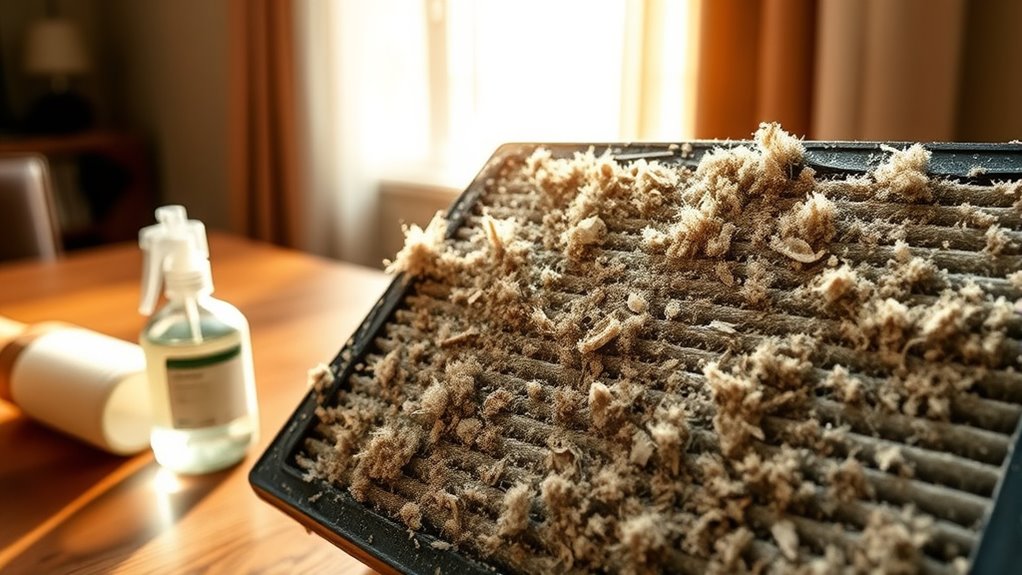
To keep your vacuum filters in top shape, it’s vital to establish a consistent maintenance routine.
Regularly clean or replace vacuum filters every 3 to 6 months, especially if you have pets or live in a dusty environment. Air purifiers can also help manage dust levels in your home. Additionally, using advanced filtration systems in your vacuum can significantly enhance air quality by trapping allergens. Incorporating an air purifier with HEPA filtration can further reduce allergens in your living space.
For foam filters, wash them with soapy water and air dry for at least 24 hours to extend filter lifespan.
Avoid cleaning HEPA filters; replace them if you notice dirt buildup or reduced suction.
Inspect cartridge and pleated paper filters regularly, gently tapping or brushing them to reduce dust accumulation.
Additionally, maintaining a clean environment can help reduce dust accumulation in your home and prolong the effectiveness of your vacuum filters.
Recommended Cleaning Frequency and Replacement Schedule
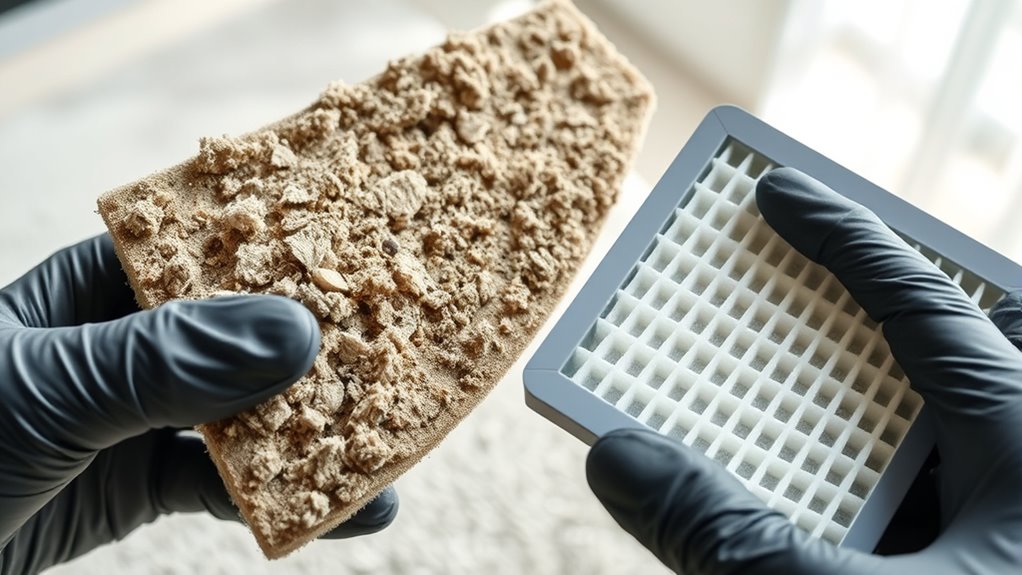
To keep your vacuum running smoothly, you should follow specific cleaning and replacement schedules for the filter.
Pay attention to factors like usage frequency and environmental conditions that can affect performance.
Recognizing when to clean or replace your filter can make a significant difference in maintaining air quality and suction power.
Cleaning Frequency Guidelines
Regularly cleaning your vacuum filter is crucial for maintaining its efficiency and performance.
For bagless models, aim to clean filters every 2-3 months, while bagged vacuums should be emptied and cleaned after each bag is full.
If you live in high-traffic areas or have pets that shed, consider a monthly cleaning frequency to prevent blockages and guarantee peak suction power.
Establishing a consistent maintenance schedule not only extends your filter lifespan but also enhances overall vacuum efficiency.
Pay attention to any visible damage on HEPA and foam filters, as these should be replaced when performance declines.
Following these cleaning guidelines will keep your vacuum running smoothly and effectively, reducing the risk of significant performance issues.
Replacement Indicators
Since maintaining your vacuum filter is vital for peak performance, it’s important to recognize when cleaning or replacement is necessary.
Watch for these signs that a vacuum filter needs replacement:
- Visible dirt buildup on the filter
- A significant decrease in suction power
- Unpleasant odors indicating dirty air
- Damage to the filter material
For maximum performance, clean the filter regularly—every 2-3 months for bagless vacuums, or every bag change for bagged models.
HEPA and foam filters can be reused multiple times, but paper filters need timely replacements after one or two cleanings.
Environmental Impact Factors
Understanding the environmental factors that affect your vacuum filter’s performance can help you determine how often to clean or replace it. High dust levels, especially in homes with pets, can lead to clogged filters, so you should check and clean your filters regularly.
If you live in an area with significant environmental pollutants or frequently open windows, your filters may accumulate dirt faster. Regular use of HVAC systems also contributes to dirt buildup, making it essential to replace filters every one to three months.
In extremely dusty environments or homes with heavy pet shedding, you might need to replace filters within a month. Maintaining clean filters is key to ensuring good home air quality and preventing strain on your vacuum or HVAC system.
Frequently Asked Questions
Why Do My Air Filters Get Dirty so Fast?
Your air filters get dirty quickly because of everyday activities like cooking and cleaning, which generate dust and debris.
If you have pets, their dander and hair contribute even more to the buildup.
Frequent opening of windows invites outdoor pollutants inside, while heavy HVAC usage during extreme weather forces the system to work harder and collect dirt faster.
Low-quality filters also clog quickly, leading to more frequent replacements.
What Is the Best Way to Clean a Vacuum Filter?
To clean your vacuum filter effectively, start by checking the type of filter you have.
If it’s a foam filter, soak it in warm, soapy water, gently squeeze to release dirt, and rinse until clear.
For pleated paper filters, use a soft brush to remove debris without washing.
Washable filters can be rinsed under running water.
Always air dry for at least 24 hours before reinserting.
Consult your manual for specific care instructions!
How Long Should a Vacuum Filter Last?
A vacuum filter usually lasts between 3 to 6 months, but this can vary based on your usage and the filter type.
If you use it frequently or have pets, you might find it clogs faster.
HEPA and foam filters can be cleaned a few times before needing a replacement, while pleated paper filters often need replacing after one or two cleanings.
Keep an eye out for decreased suction and visible dirt buildup.
Can You Wash and Reuse a Vacuum Filter?
Washing a vacuum filter is like choosing between a delicate flower and a sturdy rock.
If you’ve got a washable foam filter, you can soak it and rinse it clean. On the flip side, non-washable HEPA filters need replacing, while pleated paper filters should only be brushed off.
Always check the manufacturer’s guidelines to keep your vacuum running smoothly. Knowing what you can wash versus what you can’t makes all the difference!
Conclusion
Just like a garden needs regular tending to flourish, your vacuum filters require attention to thrive. Neglecting them leads to a tangled mess of dirt and debris, choking their performance. By cleaning and maintaining them, you nurture your home’s air quality, allowing it to bloom with freshness. Remember, a well-cared-for filter is like a vigilant gardener, keeping the weeds at bay. So, roll up your sleeves, and give your filters the care they deserve to keep your space clean and vibrant.
